Introduction
How to keep rabbits out of garden? Let’d find out.
Imagine this – you’ve poured your heart and soul into creating the most picture-perfect garden. The flowers are in full bloom, the vegetables are thriving, and there’s an air of serenity as you bask in the beauty of your hard work.
But fear not, my fellow garden enthusiasts! I’ve been there, and I’ve emerged victorious from the battlefield.
From building a fortress-like fence and strategically planting rabbit-repellent flowers to utilizing scare tactics and motion-activated sprinklers, we’re going to create a rabbit-free zone that will make your garden the envy of the neighborhood.
We’ll dive into the art of identifying rabbit damage, understanding their habits, and implementing preventive measures that will leave those rabbits scratching their heads. And trust me, my green-thumb friends, when we’re done, your garden will thank you with a burst of vibrant colors and healthy plants.
So roll up your sleeves, grab your gardening gloves, and get ready to fight back against those rascally rabbits. It’s time to protect your hard work, restore harmony to your garden, and create a haven where your plants can thrive without interruption.
Let’s do this!
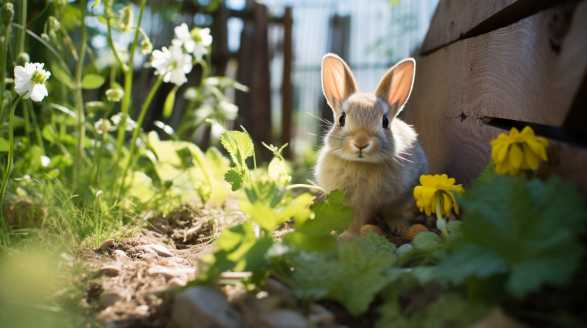
Key Takeaways
- Rabbits can cause significant damage to gardens by devouring plants, flowers, and vegetables.
- Building a sturdy fence with small gaps and burying it underground can effectively keep rabbits out of your garden.
- Certain plants, such as marigolds, lavender, and daffodils, act as natural rabbit repellents and can be strategically planted to create a barrier.
- Mulch with materials like gravel or wood chips can deter rabbits from hopping onto plants.
- Using predator urine or homemade repellent sprays with vinegar and dish soap can discourage rabbits from coming near your garden.
- Scare tactics like wind chimes, scarecrows, and reflective surfaces can startle and deter rabbits.
- Planting thorny or prickly bushes can create a physical barrier and discourage rabbits from entering your garden.
- Removing attractants like fallen fruit, vegetables, and birdseed eliminates the reason for rabbits to visit your garden.
- Motion-activated sprinklers can surprise and scare rabbits, teaching them to avoid your garden.
- Regular garden maintenance, such as trimming overgrown vegetation and removing debris, makes your garden less appealing to rabbits.
10 Natural Methods to Protect Your Garden from Rabbits
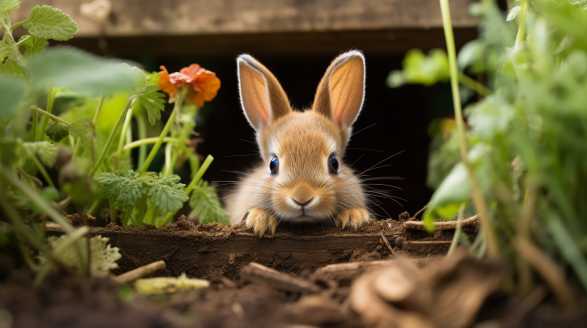
So, you’ve spent hours carefully tending to your beloved garden, nurturing your plants from seedlings to blooming flowers. It’s a labor of love, but there’s just one problem – those pesky rabbits that seem determined to chomp away at your hard work!
I’ll share with you 10 natural methods to protect your garden from rabbits. Say goodbye to those nibbling nuisances and hello to a thriving, rabbit-free garden!
1. Fence them Out
One of the most effective ways to keep rabbits away from your garden is by using a fence. A sturdy fence with tightly woven wire mesh is needed to prevent the rabbits from squeezing through.
2. Repellent Plants
Rabbits have a particular aversion to certain plants. Take advantage of this by strategically planting repellent plants around your garden.
The strong smells produced by these plants act as natural repellents, making your garden less attractive to these furry intruders.
3. Mulching Magic
Another effective way to deter rabbits from your garden is by using a layer of mulch. Rabbits dislike the texture of certain materials, such as gravel or wood chips.
Plus, mulching offers additional benefits like conserving soil moisture and suppressing weed growth.
4. Predator Urine
This method might sound a bit unorthodox, but it can be surprisingly effective. Predator urine, such as that of a fox or a coyote, creates a perceived threat to rabbits, keeping them at bay.
Just remember to reapply the urine every few weeks to maintain its effectiveness.
5. Homemade Repellent Sprays
If you prefer to take a DIY approach, you can create your own homemade repellent sprays. One simple recipe involves mixing equal parts water and vinegar, with a few drops of dish soap.
The strong scent and taste will discourage rabbits from coming near.
6. Scare Them Away
Rabbits are skittish creatures and can be easily scared off. Hang wind chimes, or place scarecrows or garden decorations with reflective surfaces around your garden.
7. Natural Barriers
Creating natural barriers can also help protect your garden from rabbits. Planting thorny or prickly bushes, like roses or blackberry bushes, around the perimeter of your garden can act as a deterrent.
8. Remove Attractants
Rabbits are drawn to areas with an abundant food supply. Remove any attractants from your garden, such as fallen fruit, vegetables, or birdseed.
9. Motion-Activated Sprinklers
For a more high-tech solution, invest in motion-activated sprinklers. These innovative devices use sensors to detect movement and then spray a sudden burst of water.
Plus, it’s a fun way to keep your garden protected!
10. Regular Maintenance
Lastly, maintaining your garden regularly is crucial in keeping rabbits away. Trim overgrown vegetation and remove any piles of debris where rabbits could hide.
Gardening should be a joyous experience, free from the stress of battling unwanted rabbit visitors. By implementing these 10 natural methods, you can create a rabbit-free sanctuary where your plants can thrive without interruption.
So, roll up your sleeves, unleash your inner green thumb, and let’s protect your garden together!
How to Identify Rabbit Damage in Your Garden and Take Action
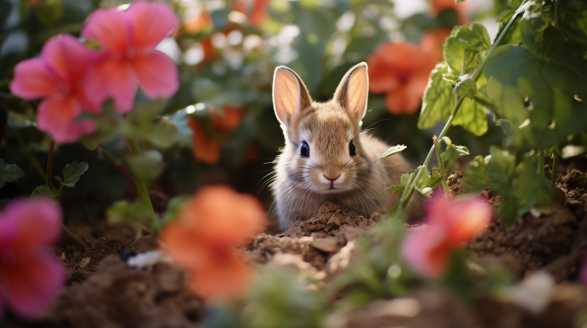
As an avid gardener, nothing is more frustrating than discovering that the beautiful plants you have carefully nurtured have fallen victim to rabbit damage. These adorable creatures may seem harmless, but their nibbling habits can wreak havoc on your garden.
I will share with you my expert tips on how to identify rabbit damage in your garden and take immediate action to protect your plants.
Here’s how to identify rabbit damage in your garden:
- Nibbled plants: One of the first signs of rabbit damage is finding plants with neatly eaten foliage. Rabbits have a voracious appetite for fresh greens, and their bites leave a distinctive clean-cut edge.
- Missing plants: If you wake up to find entire plants missing, leaving only chewed stalks behind, it is highly likely that rabbits are the culprits. Rabbits have a knack for uprooting and devouring your beloved plants overnight.
- Gnawed bark: Besides feasting on foliage, rabbits also have a propensity for gnawing on tree bark. Look for bark damage, especially near ground level, as this is a telltale sign that rabbits have been present in your garden.
- Distinctive droppings: Rabbit droppings resemble small dark pellets and are one of the surest signs of their presence. These droppings are often found near damaged plants and are an indicator that rabbits are frequenting your garden.
Now that you can identify rabbit damage, it’s time to take action:
Protecting Your Garden:
- Fencing: Building a rabbit-proof fence is an effective way to keep these critters out. Use sturdy wire mesh with small openings and ensure it is at least two feet high above the ground and buried six inches below the surface to deter burrowing.
- Repellents: There are numerous natural and commercially available repellents that can help protect your plants from rabbit damage. These can include sprays, granules, or even homemade concoctions that emit odors rabbits find unpleasant, such as garlic or cinnamon.
- Raised beds: Consider planting your garden in raised beds. The higher elevation makes it harder for rabbits to access your plants. Additionally, rabbits may be less inclined to jump into raised beds due to the loss of protective cover.
- Companion planting: Integrate plants rabbits find unappetizing, such as marigolds, onions, or herbs like rosemary and sage, among your other vulnerable plants. The strong fragrance of these plants can often deter rabbits from feasting on your prized flowers or vegetables.
Additional Tips and Tricks:
Scaring Tactics:
- Motion-activated sprinklers: Install motion-activated sprinklers that emit a sudden burst of water when triggered by movement. This serves as an excellent deterrent, scaring off rabbits and keeping them away from your garden.
- Visual deterrents: Use reflective objects like old CDs or aluminum foil strips strategically placed around your garden. The movement and shine startle rabbits, making them think twice about approaching your plants.
Natural Predators:
- Attract natural predators: Encourage predators like hawks, owls, or foxes to frequent your garden by introducing birdhouses or nesting areas. Having natural predators around can help reduce rabbit populations.
- Pets: If you have a cat or a dog, allowing them access to your garden can be an effective way to deter rabbits. The mere scent or presence of a predator can quickly dissuade rabbits from venturing into your garden.
By learning how to identify rabbit damage and taking quick action, you can protect your garden from these cute yet voracious nibblers. Whether it’s through fencing, repellents, companion planting, scaring tactics, or attracting natural predators, there are numerous strategies to safeguard your plants.
Happy gardening!
Do you spend hours tending to your beautiful flower beds, only to find them ravaged by rabbits the very next day? It can be incredibly frustrating to see those cute, furry creatures munching through your colorful blooms.
With the right exclusion techniques, you can prevent rabbits from turning your garden into their personal buffet. I’ll share my top tips and tricks to keep rabbits away from your precious flower beds.
Why are rabbits attracted to flower beds?
Before we dive into the exclusion techniques, it’s essential to understand why rabbits are so drawn to your lovely flower beds in the first place. Here are a few reasons:
- Food source: Rabbits can’t resist the tender shoots and delicious blossoms that flower beds offer.
- Shelter: Flower beds often provide rabbits with ample hiding spots and protection from predators.
- Convenience: The proximity of flower beds to their natural habitats makes them a prime target for rabbits.
The Battle Plan: Exclusion Techniques
1. Install a Bunny Fence
A sturdy barrier serves as the first line of defense against rabbit intruders. Here’s what you need to do:
- Choose the right materials: Opt for a wire mesh with small enough gaps to prevent rabbits from squeezing through.
- Height matters: Make sure your fence stands at least 2 feet tall, as rabbits are surprisingly agile and can jump quite high.
- Bury the bottom: Dig about 6 inches into the soil and secure the fence underground to prevent rabbits from burrowing underneath.
2. Utilize Natural Deterrents
Nature has its unique ways of deterring rabbits while keeping your flower beds intact. Take advantage of these natural tricks:
- Plant rabbit-resistant flowers: Certain flowers, like marigolds, daffodils, and lavender, naturally repel rabbits. They add beauty to your garden while keeping the rabbits at bay.
- Spread predator scents: Using predator scents, such as fox or coyote urine, can trick rabbits into thinking a predator is near, keeping them far away from your flowers.
- Try ‘rabbit-friendly’ plants elsewhere: Consider planting a designated area with rabbit-favored plants, like clover or lettuce, away from your flower beds to divert their attention.
3. Build Raised Beds
Rabbits can struggle to reach or jump into raised garden beds. This technique provides an added layer of protection for your flowers.
- Choose the right height: Build beds at least 1 foot high, raised high enough to deter rabbits.
- Solid walls: Ensure the sides of your raised beds are solid, with no gaps or holes. This makes it difficult for rabbits to squeeze through.
4. Create Physical Barriers
Rabbits are agile, but they can be foiled by physical barriers. Here are a few ideas to try:
- Chicken wire cloche: Construct a dome structure out of chicken wire and place it over your flower bed. This ensures rabbits can’t access your flowers while still allowing sunlight and rainfall to reach them.
- Netting or mesh covers: Drape netting or mesh over your flower beds, ensuring it is taut and secure to keep rabbits out.
5. Implement Repellents
If you prefer not to build extensive structures, repellents are an excellent option. Consider using these rabbit deterrents:
- Homemade repellents: Mix a bit of dish soap, spicy chili powder, and water in a spray bottle. Spray the mixture on and around your flowers. The taste and smell will discourage rabbits from nibbling.
- Commercial repellents: Numerous commercial rabbit repellents are available that use strong odors or tastes to keep rabbits from devouring your flowers. Follow the instructions carefully for best results.
6. Maintain Your Garden
Keeping your flower beds well-maintained acts as a preventive measure against rabbit infestation. Here’s what you should do:
- Remove hiding spots: Regularly clear away tall grass, brush piles, and any other potential hiding spots for rabbits.
- Trim overhanging branches: Cut back tree branches that provide easy access for rabbits to jump into your garden.
- Fill burrows: If you spot any rabbit burrows in your garden, fill them in promptly to discourage them from settling in.
With these exclusion techniques, you’ll have the upper hand in keeping rabbits out of your flower beds. Remember, persistence is key!
Maintaining your garden is equally crucial to preventing rabbit infestations. Now, go forth and protect your blooms from those fluffy but mischievous garden invaders!
Creating a Rabbit-Resistant Garden: Key Strategies to Implement
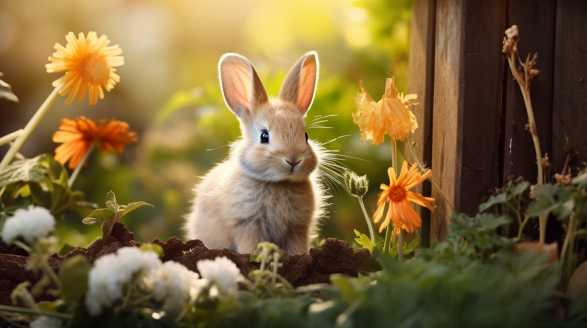
As a garden enthusiast, I’ve encountered my fair share of pesky rabbits wreaking havoc on my once immaculate flower beds. It’s frustrating to spend countless hours planting and nurturing delicate plants, only to find them devoured by these furry critters.
So, let’s dive right in!
Understanding the Rabbit Problem
Rabbits, with their insatiable appetite for tender plants, can turn your garden into their personal buffet. To combat this issue, it’s crucial to understand their habits and natural inclinations.
- Rabbits are not picky eaters: These voracious creatures will munch on a wide range of plants, from flowers and herbs to vegetables and shrubs. No plant is entirely safe from their nibbling.
- Reproduction rates are high: Rabbits breed rapidly, with a short gestation period and multiple litters each year. Taking swift action is necessary to prevent an infestation.
- Rabbits prefer sheltered areas: These cautious herbivores gravitate towards areas with dense foliage and cover, providing them with a sense of security while they indulge in your plants.
Strategic Plant Selection
Choosing the right plants is your first line of defense against rabbits. By opting for varieties that rabbits find less appealing or downright unappetizing, you can deter them from entering your garden in the first place.
- Rabbit-resistant plants: Some plants have naturally acquired protective mechanisms, such as thorns, strong smells, or bitter tastes. Include these plants in your garden to discourage rabbit visits. Examples include astilbe, daffodils, marigolds, and lavender.
- Plants with strong scents: Rabbits are highly sensitive to strong odors. Planting fragrant herbs like rosemary, thyme, and mint around the perimeter of your garden can act as a natural deterrent.
- Native plants: Native plants are often more resistant to local pests, including rabbits. They have evolved alongside wildlife, developing natural defenses that make them less appealing to rabbits. Research local options and incorporate them into your garden.
Physical Barriers
Creating physical barriers is an effective way to safeguard your garden from hungry rabbits. By denying them access or making it difficult for them to reach your plants, you can significantly reduce their impact.
- Fencing: Installing a rabbit-proof fence around your garden is perhaps the most foolproof method. Use a sturdy material like chicken wire or hardware cloth, bury it at least six inches underground to deter burrowing, and make it tall enough (about 2-3 feet) to prevent rabbits from hopping over.
- Raised beds: Constructing raised beds can create an extra hurdle for rabbits. Opt for a height of at least 18 inches, which will make it more challenging for these critters to reach your plants.
- Plant covers: Floating row covers or netting can be used to physically shield your plants. Ensure the cover is securely anchored and doesn’t touch the plants, as rabbits might still nibble through it. Remove the covers when plants require pollination or when the rabbit problem is under control.
Repellents and Deterrents
Incorporating rabbit repellents and deterrents into your gardening routine can be an additional layer of protection. While these methods are not foolproof, they can dissuade rabbits from making your garden their mealtime destination.
- Commercial repellents: Various rabbit repellents are available in the market that use strong odors or foul-tasting substances to deter these critters. Follow the instructions carefully and reapply as needed.
- Homemade repellents: You can create your own rabbit repellent by mixing ingredients like garlic, onion, cayenne pepper, and water. Spray this solution on your plants, particularly the ones that rabbits seem to favor.
- Motion-activated devices: Installing motion-activated sprinklers or lights can startle rabbits and make them reconsider their dining plans. These devices create a noisy and unfamiliar environment that rabbits might find alarming, convincing them to seek a different feeding ground.
Garden Maintenance
Finally, maintaining your garden properly can contribute to making it less attractive to rabbits. By removing potential hiding spots and providing alternative food sources, you can discourage their presence.
- Remove debris: Eliminate piles of brush, rocks, and leaf litter that could offer rabbits safe havens. Clearing these potential hiding places makes your garden less appealing to these furry intruders.
- Trim vegetation: Regularly trim shrubs and low-hanging branches to limit the amount of cover available to rabbits. Open spaces make them feel exposed, potentially dissuading them from entering your garden.
- Create a diversion: Plant a separate, rabbit-friendly area in your yard with plants like clover or alfalfa. By providing an alternative food source, you can divert their attention away from your cherished garden plants.
Creating a rabbit-resistant garden requires a combination of strategies to deter these persistent nibblers. By selecting the right plants, implementing physical barriers, using repellents and deterrents, and maintaining your garden thoughtfully, you can reclaim your green space from rabbit intruders.
Happy gardening!
Rabbit-Repellent Plants: Your Garden’s Natural Defense
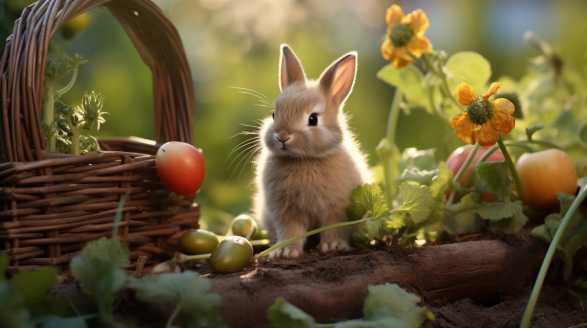
Do you love gardening as much as I do? There’s something truly magical about sowing seeds and watching them grow into beautiful plants.
These fluffy creatures may be adorable, but they can wreak havoc on your carefully tended garden. So, how can you protect your plants without sacrificing the tranquility of your garden?
I’ll share with you everything I know about rabbit-repellent plants and how you can use them to preserve the beauty of your garden.
Understanding the Rabbit Problem
Before we dive into the rabbit-repellent plants, let’s take a moment to understand the problem. Rabbits are herbivores and have a voracious appetite for plants, making your garden an all-you-can-eat buffet for them.
As a gardener, this can be disheartening and frustrating. But fear not, because rabbit-repellent plants are here to save the day!
What are Rabbit-Repellent Plants?
Rabbit-repellent plants are natural plant species that possess certain characteristics that repel rabbits. These plants can be used strategically in your garden to protect vulnerable plants from being devoured by rabbits.
Examples of Rabbit-Repellent Plants:
Now that you understand the concept of rabbit-repellent plants, let me introduce you to some fantastic plant options that will make your garden a rabbit-free zone:
1. Marigolds:
Marigolds are not only beautiful flowers that add a pop of color to your garden, but they also have natural repellent properties. Rabbits despise the pungent odor marigolds emit, so planting them at the borders of your garden or around vulnerable plants can keep those pesky critters at bay.
2. Lavender:
Lavender, with its aromatic and soothing scent, is a favorite among gardeners and humans alike. Interestingly enough, rabbits are not fans of lavender’s fragrant flowers and the bitter taste of its leaves.
3. Daffodils:
Bright and cheerful daffodils not only signify the arrival of spring but also act as a natural rabbit repellent. Rabbits dislike the taste and smell of daffodils, making them an ideal choice for protecting your garden.
4. Thyme:
Not only is thyme a tasty herb for culinary use, but it also acts as a rabbit deterrent. The strong aroma of thyme plants confuses rabbits and keeps them away from your cherished plants.
5. Sunflowers:
Sunflowers may be a delight to behold, but they can be quite off-putting for rabbits. Their tall stalks and rough leaves act as a natural barrier, making it difficult for rabbits to access your plants.
6. Rosemary:
Rosemary, an aromatic herb commonly used in cooking, also has repellent properties that rabbits dislike. The pungent smell of rosemary acts as a deterrent, making it an excellent choice for deterring rabbits from your vegetable garden or flowerbeds.
Creating a Rabbit-Repellent Garden:
Now that you have a list of rabbit-repellent plants at your disposal, it’s time to plan your garden’s natural defense. Here are some useful tips to help you get started:
1. Identify Vulnerable Areas:
Take a stroll through your garden and identify areas where rabbits are likely to enter or target your plants. These could be gaps in fences or areas where rabbits have left evidence of their activities.
2. Plan Plant Placement:
Based on your observations, strategically place the rabbit-repellent plants around vulnerable areas or create borders to act as a natural barrier. This will discourage rabbits from entering your garden in the first place.
3. Mix and Match:
Don’t limit yourself to just one type of rabbit-repellent plant. Instead, experiment with different combinations to create a diverse and attractive garden.
4. Regular Maintenance:
Like any garden, maintaining your rabbit-repellent garden is crucial for its success. Regularly trim the plants, deadhead flowers, and remove any fallen leaves or debris.
Rabbit-repellent plants are a valuable asset for any gardener who wants to protect their garden from these furry intruders. By using plants such as marigolds, lavender, daffodils, thyme, sunflowers, and rosemary strategically, you can create a garden that rabbits will think twice about entering.
Happy gardening!
The Best Rabbit-Proofing Products for Every Garden
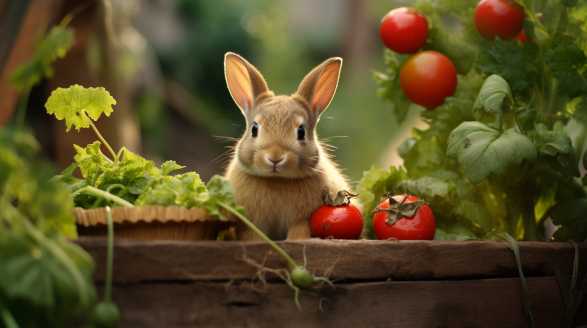
As a gardening enthusiast, I have faced my fair share of battles with rabbits ravaging my beautiful plants. These adorable little creatures may seem harmless, but when it comes to your garden, they can be quite the menace.
I will share with you the best rabbit-proofing products on the market, ensuring that your garden remains a sanctuary of beauty and greenery. So, let’s dive right in!
1. Rabbit Fencing
Installing rabbit fencing is an excellent way to protect your garden from these mischievous critters. Opt for a fence with small gaps, ideally no larger than 1 inch, to prevent them from squeezing through.
Additionally, make sure to bury the fence about 6 inches deep to prevent rabbits from burrowing underneath it.
2. Garden Netting
Garden netting provides an easy and cost-effective solution to keep rabbits at bay. Simply drape the netting over your precious plants, creating a barrier that rabbits won’t be able to penetrate.
3. Raised Beds
Creating raised beds is not only a practical gardening technique but also an effective rabbit deterrent. By elevating your plants, you make it more challenging for rabbits to access them.
4. Repellent Sprays and Pellets
Rabbit repellent sprays and pellets can be fantastic tools in protecting your garden. These products typically contain natural ingredients like garlic, chili, or predator urine, emitting a scent that rabbits find unpleasant.
5. Motion-Activated Sprinklers
If you’re looking for a more high-tech approach to rabbit-proofing, motion-activated sprinklers might be the solution for you. These devices use sensors to detect rabbits’ movement and then spray a burst of water, startling them away.
6. Planting Rabbit-Resistant Varieties
Choosing rabbit-resistant plant varieties is a proactive way to discourage rabbits from munching on your garden. Some plants naturally possess properties that make them less appealing to rabbits.
Incorporating these plants into your garden will make it less tempting for rabbits to pay a visit.
7. Remove Attractive Hideouts
Rabbits love hiding in cozy spots, so it’s important to eliminate any potential hideouts in your garden. Trim overgrown shrubs, clear away brush piles, and seal off any gaps under sheds or decks where rabbits might seek shelter.
8. Scare Tactics
Scare tactics can be effective in deterring rabbits, but they require some creativity. Consider placing visual deterrents like scarecrows or reflective objects around your garden.
Remember to periodically change their location and appearance to prevent rabbits from becoming accustomed to them.
9. Companion Planting
Incorporating companion plants into your garden can help repel rabbits by confusing their senses. Some plants, like onions, garlic, and herbs, emit odors that rabbits find offensive.
10. Regular Garden Maintenance
Last but not least, maintaining a well-kept garden is essential in preventing rabbits from seeing it as a buffet. Remove fallen fruit, clean up debris, and promptly harvest ripe vegetables.
Rabbit-proofing your garden doesn’t have to be an arduous task. With the wide array of rabbit-proofing products available, you can easily safeguard your plants and maintain the beauty of your garden.
By implementing these strategies, you can enjoy a flourishing garden while keeping those pesky rabbits at bay. Happy gardening!
The Ultimate Guide to Rabbit-Proofing Your Garden
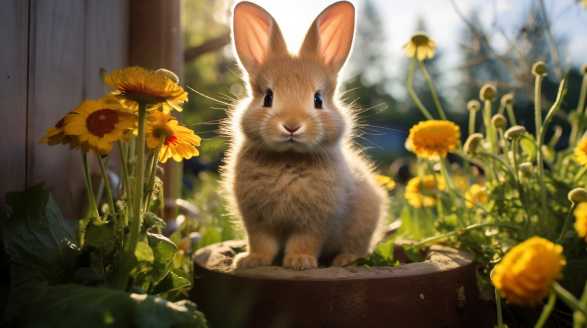
As someone who loves gardening, I understand the immense frustration that comes with finding out that your beloved plants have been devoured by a group of ravenous rabbits. These cute yet destructive creatures can wreak havoc on your gardening efforts if you don’t take the necessary precautions.
So, let’s hop right into it!
Understanding the Rabbit’s Mindset
Before we dive into the various techniques and strategies to rabbit-proof your garden, it’s important to understand the mindset of these furry fiends. Rabbits are naturally curious and persistent creatures that will go to great lengths to reach your delectable plants.
Now that we know what we’re up against, it’s time to take action.
Step 1: Identify Your Garden’s Vulnerable Areas
The first step in rabbit-proofing your garden is identifying the areas that rabbits find most enticing. Here’s a helpful list to get started:
- Flowerbeds with delicate blooms
- Vegetable patches filled with freshly sprouted seedlings
- Low-hanging fruit and berry bushes
- Unprotected root vegetables like carrots and beets
- Tender shoots of ornamental grasses
Rabbit-Proofing Techniques
Now that you have a good understanding of what attracts rabbits to your garden, it’s time to implement some rabbit-proofing strategies. Here are a few tried and tested methods:
Fence Them Out
1. Install Wire Mesh Fencing
Creating a physical barrier around your garden is one of the most effective ways to keep rabbits at bay. Use wire mesh fencing with small gaps (no wider than one inch) to prevent the bunnies from squeezing through.
2. Embrace Some Chicken Wire
If you don’t want to fence your entire garden, consider using chicken wire to protect specific areas and delicate plants. Simply create a wire cage around vulnerable plants by fastening the chicken wire to stakes driven into the ground.
Make Your Garden Less Desirable
1. Get Prickly with It
Rabbits have a strong aversion to prickly textures. Planting thorny bushes like roses, barberry, or holly around the perimeter of your garden can create a natural deterrent.
2. Bring On the Aromas
Rabbits also have sensitive noses, so utilize strong scents to keep them away. Plant fragrant herbs like lavender, sage, and rosemary throughout your garden.
Scare Tactics
1. Shake Things Up
Rabbits are skittish creatures, so introducing unexpected sounds and movements can be highly effective in scaring them away. Hang wind chimes, aluminum pie pans, or even old CD discs around your garden.
2. Unleash the Power of Motion Sensor Sprinklers
Motion sensor sprinklers are an excellent investment for rabbit-prone gardens. These clever devices detect movement and spray water, startling the rabbits and instinctively driving them away.
Natural Repellents
1. Use Predator Scents
Rabbits are constantly on the lookout for predators, and the scent of their enemies sends them scurrying. Products like dried blood meal or fox urine can be effective in keeping rabbits away.
2. Plant Rabbit-Repellent Flowers
Certain flowers have natural properties that rabbits find unappetizing. Incorporate these flowers throughout your garden as an added layer of protection.
Stay Vigilant: Regular Maintenance
While implementing rabbit-proofing techniques is crucial, it’s equally important to regularly maintain your garden. Here are some tips to stay on top of rabbit control:
- Inspect your fencing periodically for any breaches or holes. Repair them immediately to maintain an effective barrier.
- Trim overgrown vegetation around your garden perimeter that may offer hiding spots for rabbits.
- Remove any fallen fruits or vegetables promptly to eliminate an easy food source.
- After heavy rain, inspect your garden for any signs of burrowing. Fill in the holes to prevent rabbits from nesting in the vicinity.
With these foolproof strategies and regular maintenance, you can create a rabbit-proof haven for your plants, where they can blossom and flourish without the fear of becoming a bunny buffet.
Now, go forth and conquer the rabbit invasion, my fellow garden enthusiasts! With a little perseverance and proactive measures, you’ll soon have a thriving and rabbit-free garden that will make your neighbors green with envy.
Dealing with Rabbits in Your Garden: Expert Tips and Advice
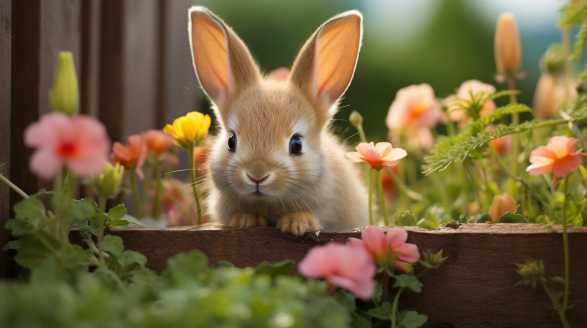
As a passionate gardener, there’s nothing more frustrating than seeing your hard work and beautiful plants being devoured by pesky rabbits. These furry critters can wreak havoc on your garden, leaving you feeling both perplexed and exasperated.
With the right tips and advice, you can successfully deter rabbits and protect your beloved garden. I will share my expert knowledge on dealing with rabbits, providing you with effective strategies and techniques.
Understanding the Rabbit Problem
Rabbits are notorious for their appetites and ability to reproduce quickly. Here are some important facts to understand about these garden invaders:
- Rabbit species: The most common species that cause trouble in gardens are the Eastern Cottontail and the European Rabbit.
- Feeding habits: Rabbits are herbivores, and they particularly enjoy feasting on young, tender plants, including vegetables, fruits, and flowers.
- Reproduction: Female rabbits can give birth to several litters each year, with each litter containing up to 8 baby rabbits (kits). This rapid reproduction contributes to their population growth and makes controlling them more challenging.
Identifying Rabbit Damage
To effectively deal with rabbits, it’s important to recognize the signs of their presence and the damage they cause. Look out for:
- Nibbled leaves and stems: Rabbits have a distinct feeding pattern, leaving behind clean, 45-degree angled cuts on plants.
- Unusual droppings: Rabbit droppings resemble small, round pellets, similar in size to marbles.
- Burrows and nests: Rabbits create burrows in gardens, typically near fences or bushes, as well as nests in tall grass or open ground.
Effective Strategies to Deter Rabbits
Thankfully, there are several proven methods you can employ to deter rabbits from making your garden their personal buffet. Here are some expert tips and advice:
1. Fencing:
Creating a physical barrier with sturdy fencing is one of the most effective ways to keep rabbits out. Follow these guidelines:
- Use chicken wire or hardware cloth with small gaps (1 inch or smaller).
- Dig the fence at least 6 inches into the ground to prevent rabbits from burrowing underneath.
- Make sure the fence is at least 2 feet high, as rabbits can jump up to 3 feet.
2. Natural Repellents:
Certain plants and natural substances can help deter rabbits from entering your garden. Consider these options:
- Marigolds: Plant marigolds around your garden as their strong smell repels rabbits.
- Garlic and onions: Growing these pungent vegetables near susceptible plants can deter rabbits.
- Cayenne pepper: Sprinkle cayenne pepper or a similar hot spice in your garden as rabbits dislike the smell and taste.
- Predator urine: Purchase predator urine (such as coyote or fox urine) from garden centers or online, and apply it around your garden to fool rabbits into thinking predators are present.
3. Scare Tactics:
Startle and deter rabbits using various scare tactics. Try these methods:
- Motion-activated sprinklers: Install motion-activated sprinklers that release a sudden burst of water when rabbits approach, scaring them away.
- Noise-making devices: Hang wind chimes, aluminum foil strips, or pie pans in your garden to create noise and frighten rabbits.
- Predator decoys: Place fake owls, snakes, or hawks around your garden to mimic natural predators and deter rabbits.
4. Organic Pest Control Products:
If all else fails, consider using organic pest control products specifically designed to repel rabbits. Look for plant-friendly sprays or granules containing natural ingredients like garlic, pepper, or predator urine.
5. Essential Garden Maintenance:
Maintaining a well-groomed garden can discourage rabbits from taking up residence. Follow these best practices:
- Remove hiding spots: Keep the garden area clean and properly trim any tall grass, shrubs, or bushes where rabbits can hide.
- Clear away debris: Remove fallen fruit, plant waste, and any other potential food sources that might attract rabbits.
- Cover vulnerable plants: Use mesh nets, covers, or cloches to protect young and vulnerable plants until they grow more mature and less appealing to rabbits.
Dealing with rabbits in your garden doesn’t have to be a never-ending battle. By employing a combination of fencing, natural repellents, scare tactics, organic pest control products, and proper garden maintenance, you can maintain a beautiful and rabbit-free garden all year round.
Get out there and reclaim your garden from those mischievous rabbits!
Garden Fencing 101: Keeping Rabbits Out of Your Yard
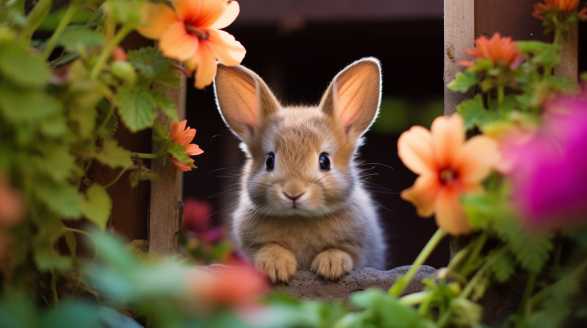
If you’re like me, you enjoy spending time in your garden, admiring the vibrant colors and lush greenery. However, nothing can be more frustrating than discovering that rabbits have invaded your yard and started munching on your beloved plants.
I will share with you some invaluable tips and tricks for keeping those pesky rabbits at bay.
Understanding the Rabbit Menace
Before we dive into effective preventive measures, let’s take a moment to understand the rabbit menace. Rabbits are notorious for their appetite for fresh, leafy greens.
With their ability to reproduce rapidly, a small rabbit population can quickly turn into a garden-devouring army.
Identifying Signs of Rabbit Damage
To tackle any issue head-on, it’s essential to identify the problem. Signs of rabbit damage may include nibbled leaves, stems that appear as if they’ve been neatly snipped by scissors, and even silky rabbit fur left behind.
Building a Rabbit-Proof Fence
One of the most effective methods to keep rabbits out of your yard is by installing a sturdy rabbit-proof fence. Here’s a step-by-step guide:
- Determine the perimeter: Assess the size of your garden and mark the perimeter where the fence will be installed.
- Choose the right materials: Opt for materials that are strong and durable, such as chicken wire or wire mesh. Ensure the openings are small enough to prevent rabbits from squeezing through.
- Install fence posts: Place fence posts at regular intervals around the perimeter. Ideally, posts should be at least 2 feet deep to ensure stability.
- Attach the mesh: Secure the wire mesh or chicken wire to the fence posts, ensuring there are no gaps or loose ends.
- Dig a trench: Bury the bottom of the fence at least 6 inches deep to prevent rabbits from digging under it.
Natural Deterrents
Prevention is always better than cure, and when it comes to garden fencing, there are some natural deterrents that rabbits simply can’t resist. Consider incorporating the following plants and methods into your garden design:
Plant Rabbit-Repelling Flowers
- Marigolds: Rabbits dislike the pungent scent of marigolds. Plant them strategically around your garden to form a natural barrier.
- Snapdragons: These beautiful flowers not only add color to your garden but also repel rabbits. Plant them near vulnerable areas.
- Lavender: With its strong aroma, lavender is a great deterrent against rabbits. Plant it in borders or near entrance points.
Create a Sensory Overload
- Add textures: Rabbits dislike prickly textures. Incorporate plants like thistles, holly, or roses to make your garden less appealing to them.
- Use gravel or stone: Sprinkle gravel or place stones around the perimeter of your garden. This will make it uncomfortable for rabbits to move around.
Additional Tips and Tricks
To truly win the battle against rabbits, it’s important to have a few tricks up your sleeve. Here are some extra tips you can try:
Scare Tactics
- Motion-activated sprinklers: Install these sprinklers around your garden. Whenever a rabbit comes near, they will be startled by a sudden spray of water.
- Fake predators: Rabbits are wary of predators. Placing realistic-looking decoy predators, such as statues or cutouts, can deter them from entering your garden.
Wildlife-Friendly Barriers
- Chicken wire cloches: Protect vulnerable plants by creating individual cloches using chicken wire. This allows your plants to flourish while keeping rabbits at bay.
- Row covers: Use lightweight mesh or fabric covers to shield your vegetable patches. This not only protects against rabbits but also keeps other pests away.
With these garden fencing tips and tricks, you are well on your way to reclaiming your garden from those voracious rabbits. Remember, a combination of preventive measures, natural deterrents, and a touch of creativity can work wonders in keeping your yard rabbit-free.
Happy gardening!
Conclusion
Wow, what an adventure it has been! We started off with a garden overrun by pesky rabbits, but armed with our newfound knowledge, we’ve turned the tables and created a rabbit-free oasis.
But here we stand, victorious, with a garden that is thriving and flourishing like never before.
As I look upon my once beleaguered flower beds, I can’t help but feel an overwhelming sense of pride. The vibrant colors and lush foliage are a testament to our hard work, determination, and refusal to let those mischievous rabbits defeat us.
I’ve learned so much along the way. From identifying rabbit damage and understanding their habits to implementing preventive measures and utilizing scare tactics, each step has been a building block in creating our rabbit-free paradise.
But what makes this journey truly special is the sense of community I’ve felt as we’ve navigated these challenges together. We’ve been united in our mission to protect our gardens and support one another with tips and advice.
So my fellow garden warriors, as we bid farewell to this adventure, let’s not forget the lessons we’ve learned. Let’s continue to share our knowledge, inspire one another, and create beautiful, rabbit-free gardens that bring joy to our lives.
Thank you for joining me on this journey, and here’s to many more flourishing gardens and victorious battles against those furry invaders. Happy gardening, my friends!
Frequently Asked Questions
How can I keep rabbits out of my garden?
There are several methods you can try to keep rabbits out of your garden. Some effective techniques include installing a fence, using commercial rabbit repellents, planting rabbit-resistant plants, using natural repellents like garlic or hot pepper, maintaining a clean and tidy garden, and using physical deterrents like scarecrows or noise-making devices.
What kind of fence should I use to keep rabbits out of my garden?
To keep rabbits out of your garden, it is recommended to use a fence that is at least 2 feet high and buried at least 6 inches deep into the soil. The fence should have small mesh or wire gaps that are no larger than 1 inch in diameter.
Are there any plants that rabbits dislike?
Yes, there are some plants that rabbits tend to avoid. These include aromatic plants like lavender, sage, and oregano, as well as plants with thorny or prickly stems like roses or blackberry bushes.
Can I use homemade repellents to keep rabbits away from my garden?
Yes, you can try using homemade repellents to keep rabbits away from your garden. Some common homemade repellents include mixing garlic and water, spraying diluted vinegar around the garden, or sprinkling cayenne pepper or hot sauce on plants.
How often should I apply commercial rabbit repellents?
The frequency of applying commercial rabbit repellents may vary depending on the product and its instructions. In general, it is recommended to apply the repellent every few weeks or after rainfall.
Should I clean up fallen fruits and vegetables from my garden to keep rabbits away?
Yes, it is important to clean up fallen fruits and vegetables from your garden. Ripe and fallen produce can attract rabbits to your garden and encourage them to stay.
Are there any natural predators that can help keep rabbits away from my garden?
Yes, natural predators like dogs, cats, owls, hawks, and snakes can help deter rabbits from entering your garden. If you have pets, allowing them to spend time in your garden can help keep rabbits away. Additionally, you can create a wildlife-friendly environment by providing suitable habitats for these predators, which may help discourage rabbits from venturing into your garden.

Do Rabbits Know Their Names
Introduction Have you ever wondered if your furry rabbit friend can actually recognize its name? As a proud rabbit owner myself, I’ve always pondered this intriguing question. I’ve done some thorough research, gathered expert opinions, and even tapped into my own personal experiences to bring you all the juicy details. We all know that rabbits […]
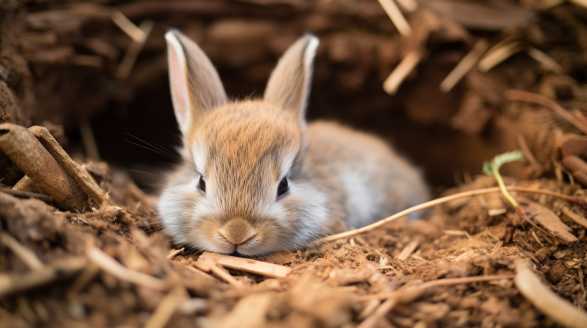
Is Aspen Bedding Safe For Rabbits
Introduction Hey there rabbit owners! Are you looking for the safest and most comfortable bedding option for your fluffy friend? we’ll be diving into the topic of aspen bedding for rabbits and exploring its safety and benefits. As a passionate rabbit owner myself, I understand the importance of choosing the right bedding material for our […]

Are Cats And Rabbits Related
Introduction Hey there, animal enthusiasts! Are you ready for a wild ride into the world of genetic connections and surprising similarities? You heard that right – these seemingly unrelated creatures may just have more in common than meets the eye! Picture this: a majestic lion and a cute little bunny hopping through the fields together. […]
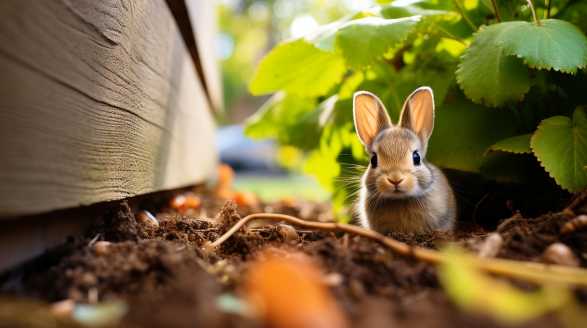
What To Do With Baby Rabbits In Your Yard
Introduction Are you ready to dive into the wonderful world of baby rabbits? Well, you’re in for a treat! Whether you stumbled upon a litter of baby rabbits or are a proud rabbit owner, this guide has got you covered. First things first, we’ll start by understanding the needs of baby rabbits. These cute little […]
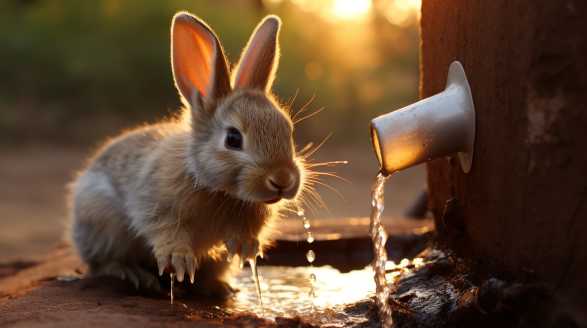
What Do Rabbits Drink
Introduction Are you a rabbit owner looking to make sure your furry friend is getting the best care possible? You’re in the right place! You might already know that rabbits need a balanced diet to stay healthy, but did you know that water is a crucial part of that equation? It’s true! But how much […]

How To Keep Rabbits Warm in The Winter
Introduction Hey there, fellow rabbit lovers! Winter is just around the corner, and as responsible bunny owners, it’s essential for us to ensure the well-being and comfort of our adorable companions. Winter can be a bit challenging for rabbits, who are sensitive creatures that require extra care to thrive in low temperatures. From managing humidity […]
